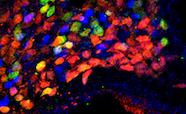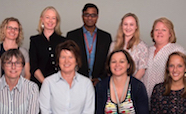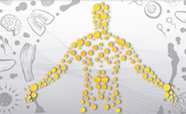This selection of University of Otago research groups investigate a multitude of elements influencing pregnancy and child development.
Centre for Neuroendocrinology
 The CNE comprises ten research groups focused upon understanding how the brain controls hormone levels and how hormones control brain function.
The CNE comprises ten research groups focused upon understanding how the brain controls hormone levels and how hormones control brain function.
We have three themes of research that focus upon understanding the neural regulation of:
- Reproduction
- Body weight and metabolism
- Stress
Email dave.grattan@otago.ac.nz
Web otago.ac.nz/neuroendocrinology
Department of Women's and Children's Health
 Providing outstanding health care to women, youth, children, their families and whānau
Providing outstanding health care to women, youth, children, their families and whānau
The Department of Women's and Children's Health at the Dunedin School of Medicine has two sections:
Both sections have a long and proud tradition in the University of Otago for their teaching and research.
The Department holds positions of national leadership in the form of:
- Curatorship of the National Mortality Review Data Group
- Hosting of the New Zealand Paediatric Surveillance Unit
- New Zealand Child and Youth Epidemiology Service
These three units have been brought together under the banner of the Child Youth Policy Research Support Service (CYPRSS).
Email wch.admin@otago.ac.nz
Web otago.ac.nz/dsm-wchealth/research
Late effects of prematurity study
 Modern neonatal practice has significantly improved outcomes for children born very preterm.
Modern neonatal practice has significantly improved outcomes for children born very preterm.
However, as they grow up, they are at increased risk for a range of neuro-developmental problems that impact on both home and school life.
A Canterbury team has been studying the brain and behavioural development since birth, of 110 children born very preterm along with 113 term born peers.
Email christchurch@otago.ac.nz
Web otago.ac.nz/christchurch/research/mentalhealthclinicalresearch/otago627545.html
Maternal and Fetal Health Group
 This research group covers both maternal and fetal health and outcome.
This research group covers both maternal and fetal health and outcome.
Our work includes database development for both complex fetal problems and for mothers with underlying medical issues.
Our staff engage in a number of clinical trials in New Zealand and internationally exploring:
- Placental transfusion (Sydney)
- Neuroprotection of magnesium sulphate (Adelaide) and related MRI scanning (Auckland)
- Sildenafil therapy in early onset intrauterine growth restriction (Auckland)
- Optimal glycaemic targets for gestational diabetes (Auckland)
- Prediabetes in pregnancy (Christchurch)
- Protective factors of Syncytial Virus vaccine against lung disease in babies (USA)
- Baby movements (Brisbane)
Email obgyn.uoc@otago.ac.nz
Web otago.ac.nz/christchurch/research/maternalfetalhealth
Molecular pathogenesis (Hung and Slatter Laboratory)
 Why do cancer cells survive and proliferate while fresh new fetal cells fade and die?
Why do cancer cells survive and proliferate while fresh new fetal cells fade and die?
In the Hung and Slatter Laboratory, Department of Pathology, we are interested in translating knowledge about some of the most fundamental aspects of cell fate to the bedside. This work involves tissue samples from many different conditions such as precancerous lesions, cancer, the placenta, and autoimmune disease.
In conjunction with Dr Celia Devenish, in the Dunedin School of Medicine Department of Children's and Women's Health, “The Otago Placental Study (OPuS)” is being established as a cohort of abnormal and normal placentas for study. We have shown that human papillomavirus (HPV) in the placenta is a key factor in some complications during pregnancy.
Email tania.slatter@otago.ac.nz
Web otago.ac.nz/dsm-pathology/research/otago117895.html
National Addiction Centre
 The National Addiction Centre (formerly the National Centre for Treatment Development (Alcohol, Drugs & Addiction)) was established by the Alcohol Advisory Council of New Zealand in 1996 particularly as a resource for the alcohol and drug treatment field of New Zealand.
The National Addiction Centre (formerly the National Centre for Treatment Development (Alcohol, Drugs & Addiction)) was established by the Alcohol Advisory Council of New Zealand in 1996 particularly as a resource for the alcohol and drug treatment field of New Zealand.
We are a university-based centre dedicated to improving treatment and prevention of addiction and related problems for people in Aotearoa New Zealand.
It is intended that output from the National Addiction Centre research will motivate both the teaching and consultation activity of the Centre in line with three guiding principles.
The National Addiction Centre is:
- Committed to working in accord with the letter and spirit of the Treaty of Waitangi as the founding document of modern New Zealand society
- Focused on the people in Aotearoa New Zealand who have addiction and co-existing disorders related problems and their families/whanau
- Dedicated to assembling scientific evidence as the basis for improving treatment for people with these problems
Email simon.adamson@otago.ac.nz
Web otago.ac.nz/christchurch/research/nac/
National Centre for Lifecourse Research (NCLR)
 The aim of the National Centre for Lifecourse Research is to build collaborations via research and policy translation nationally and internationally.
The aim of the National Centre for Lifecourse Research is to build collaborations via research and policy translation nationally and internationally.
The NCLR and partners have a long history of conducting world-leading lifecourse research with particular emphasis on:
- Research on human development aimed at informing policy and practice
- Intervention research: Assessing the impact of programmes and interventions on people's lives
Email moana.theodore@otago.ac.nz
Web otago.ac.nz/nclr
The New Zealand Mortality Data Review Group—Te Rōpū Kohi Pitopito Mōhiotanga mō te Taka Mate
 The NZ Mortality Review Data Group—Te Rōpū Kohi Pitopito Mōhiotanga mō te Taka Mate, was established in 2003 to support the national Child and Youth Mortality Review Committee (CYMRC). We now also support the Perinatal and Maternal Mortality Review Committee (established 2006), and since 2016, the Perioperative Mortality Review Committee.
The NZ Mortality Review Data Group—Te Rōpū Kohi Pitopito Mōhiotanga mō te Taka Mate, was established in 2003 to support the national Child and Youth Mortality Review Committee (CYMRC). We now also support the Perinatal and Maternal Mortality Review Committee (established 2006), and since 2016, the Perioperative Mortality Review Committee.
We have a contract with the Health Quality & Safety Commission to receive and store data, manage a database and provide data and research support for the above committees. We are also heavily involved in the CYMRC research programme. Having been involved in mortality review from the inception of the first still-existing national mortality review committee in 2002, we have a wealth of experience and expertise in this area.
The group receives information from a variety of sources, such as health, coronial, transport, water safety and child protection data, and data gained from the process of local review of each death, which is stored in a comprehensive database. This is a valuable resource that is being used increasingly to research areas of interest and importance.
We have expertise in mortality research, the process of mortality review, and the development of IT systems to support the above. Our team is made up of data and IT experts, research analysts and a clinical epidemiologist.
Email mortality.group@otago.ac.nz
Web https://secure-www.otago.ac.nz/nzmrdg
Otago Global Health Institute (OGHI)
 At the Otago Global Health Institute (OGHI), we foster partnerships to help solve global health problems. OGHI harnesses both technical and collaborative strengths across the Divisions, Schools, and Departments of the University of Otago to make them available to share with partners as we seek together to find solutions to complex global health problems.
At the Otago Global Health Institute (OGHI), we foster partnerships to help solve global health problems. OGHI harnesses both technical and collaborative strengths across the Divisions, Schools, and Departments of the University of Otago to make them available to share with partners as we seek together to find solutions to complex global health problems.
Email globalhealth@otago.ac.nz
Reproduction, Genomics and Development Research Group
 The Reproduction, Genomics and Development Group, in the Department of Anatomy, is made up of a number of labs that explore different aspects of development: from fertilisation and the processes governing the very first cellular divisions, through to adulthood, and how problems that arise during early development and gestation may have effects on the health of individuals and populations.
The Reproduction, Genomics and Development Group, in the Department of Anatomy, is made up of a number of labs that explore different aspects of development: from fertilisation and the processes governing the very first cellular divisions, through to adulthood, and how problems that arise during early development and gestation may have effects on the health of individuals and populations.
Our group explores these questions in humans, model systems, and a host of unique and understudied animal taxa.
Email greg.anderson@otago.ac.nz
Web otago.ac.nz/anatomy/research/r-g-d
School of Pharmacy
 The School of Pharmacy has a very active research programme with disciplines ranging from science to humanities.
The School of Pharmacy has a very active research programme with disciplines ranging from science to humanities.
We have three main research areas:
- Pharmaceutical Sciences: drug discovery, drug metabolism and drug action to extend the range of drugs available and to provide a scientific basis for the quality use of medicines and bioactive substances.
- Clinical Pharmacy: concerned with patient care and the optimisation of medicine use in order to promote health and wellness, and prevent disease.
- Social Pharmacy: our research focuses mainly on access to, and use of medicines.
Our School of Pharmacy child health research page provides a taste of our relevant research.
Email pharmacy.research@otago.ac.nz
Web otago.ac.nz/pharmacy/research
Te Rōpū Rangahau Hauora A Eru Pōmare
 Te Rōpū Rangahau Hauora a Eru Pōmare strives to create a Kaupapa Māori space committed to improving Māori health outcomes and eliminating inequalities through quality science and ongoing theoretical development. It takes a rights-based approach consistent with the Treaty of Waitangi, and is engaged with community through a spectrum of influence from community development, policy advocacy, research dissemination and Māori health research workforce development.
Te Rōpū Rangahau Hauora a Eru Pōmare strives to create a Kaupapa Māori space committed to improving Māori health outcomes and eliminating inequalities through quality science and ongoing theoretical development. It takes a rights-based approach consistent with the Treaty of Waitangi, and is engaged with community through a spectrum of influence from community development, policy advocacy, research dissemination and Māori health research workforce development.
Read more about our work for young mothers:
Email bridget.robson@otago.ac.nz
Web otago.ac.nz/wellington/publichealth/research/erupomare
